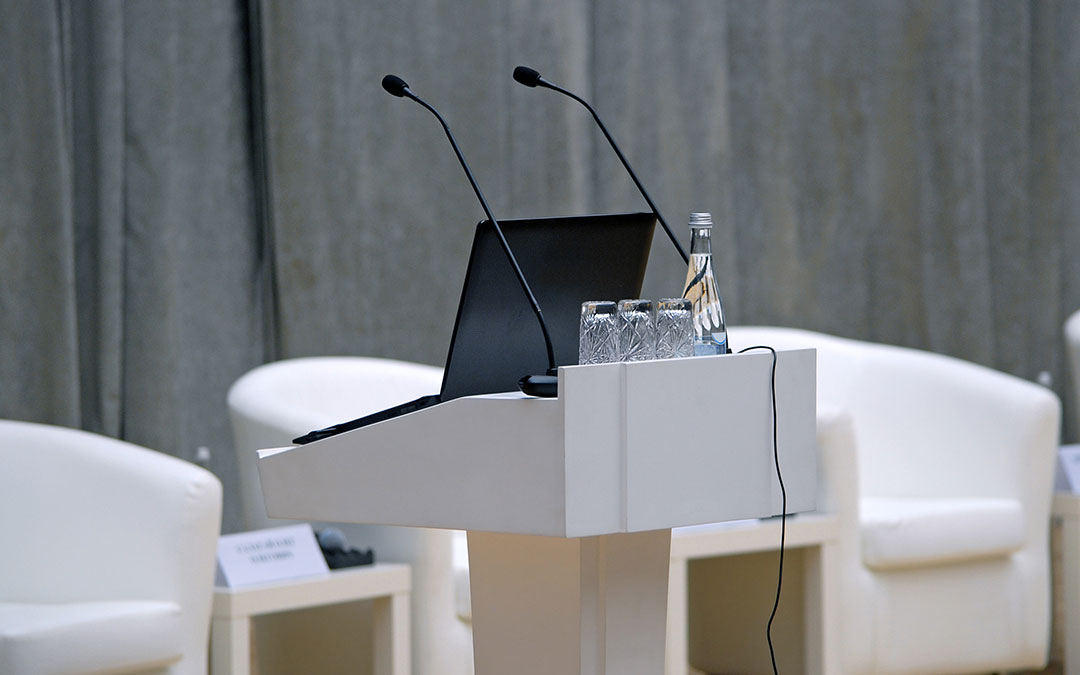Podium vs. Lectern: What’s In A Name?
If I asked 1,000 event professionals to give me the name of the upright piece of furniture with the slanted top that a speaker stands behind to deliver her speech, the vast majority of you would say “Podium.” And you’d be wrong. But really, who cares?
The thing I just described is actually called a lectern. However if you want to rent one, most A/V or party rental companies list them as podiums. In fact, I looked at the websites of 10 rental companies nationwide, and 9 of them list this item as a podium. Why? Because that’s what most of us call them.
Then what’s a podium, you ask? A podium is defined as a raised platform on which a speaker stands during a presentation (or what most of us would call a stage).
And here we have the conundrum. When dictionaries and glossaries tell us an item is one thing, but in common parlance it’s referred to as something else, what are we to do?
Personally, I think that while it’s always good to know the proper definition of something, you’re better off using the words that the vast majority of people are calling it. Otherwise you’ll have to say things like this, “Please order me a lectern for this event, though when you place the order with the rental company, ask for a podium.” A bit cumbersome, don’t you think?
Champagne vs. Sparkling Wine
Another example is Champagne, though this is a bit touchier. When a venue offers to throw in a Champagne toast, you and they are thinking of sparking wine, though you can legally only call it Champagne if it comes from grapes grown in the Champagne region of France. Sparkling wine just doesn’t sound as good, though.
When waiters start passing (I wanted to say “butlered” but Word is telling me that is not an actual word) trays of sparkling wine to your guests, most of them would tell you they’re drinking Champagne, without having any idea where it’s from.
‘Impactful’ – Is It A Word?
When I ran my event company, my favorite word to use in proposals was “impactful”, when describing the kind of event we would create for our clients. Yet impactful is not considered a word in many dictionaries. I used it anyway, because I knew the people reading it would know that it meant what I thought it meant.
And that, ultimately, is the goal. You and I can use a made up word, but if we both attribute the same meaning to it, we’ll be able to do business just fine. However if the client (boss, honoree, speaker, etc.) is expecting one thing, and you’ve delivered something totally different, being able to hide behind the Merriam-Webster definition is not going to save you from getting yelled at.
Premium vs. Top Shelf Bar
Types of open bar are a common example. Various venues call their bar packages different names, such as Premium Bar, Top Shelf Bar, etc. These names are meaningless. What matters is the types and brands of liquor the venue includes in those packages, and whether that’s acceptable to you. If you’re not demanding a specific list, then you’re asking for trouble, because the ceo doesn’t care that you’ve arranged a Top Shelf Bar if he can’t get the Belvedere vodka, or Patron Silver tequila, that he likes. We use this often in our courses as an example of how easily preventable misunderstandings can blow up into big problems.
Another example is brand name products that have become universally accepted definitions of a category. If you ask someone for a Q-Tip, Kleenex, or Band-Aid, you’re really asking for cotton swabs, tissues, or bandages, but everyone will know what you mean.
Conclusion
Words are things we create to attach meaning to something, to save us time from saying “the thing on a stage with a slanted top that a speaker stands behind.” There’s no harm in knowing how dictionaries define a word, but if you want to get things done, make sure the person you’re speaking to understands and shares that definition.
For a deeper dive into how words get into dictionaries, check out this Ted Talk by Anne Curzan.


